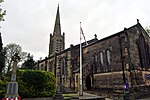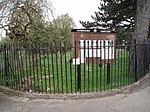Somercotes

Somercotes is a village and civil parish in the district of Amber Valley in the English county of Derbyshire, close to the border with Nottinghamshire. It is a former mining village and was once surrounded by more than five pits. The village has numerous shops, pubs, food outlets and other businesses. It has industrial areas at Cotes Park and Birchwood. Whilst increasingly urbanised, there is still some agricultural land in the northern and western parts of the parish, and a small nature reserve at Pennytown Ponds. It has primary and secondary schools, along with the Church of St. Thomas and a Methodist church. The population at the 2011 census was 6,255, up almost 9% from 5,745 in 2001 (figures for the 'ward', which may include Leabrooks).
Excerpt from the Wikipedia article Somercotes (License: CC BY-SA 3.0, Authors, Images).Somercotes
Somercotes Hill, Amber Valley
Geographical coordinates (GPS) Address Nearby Places Show on map
Geographical coordinates (GPS)
| Latitude | Longitude |
|---|---|
| N 53.079 ° | E -1.367 ° |
Address
Somercotes Fish and Chips and Kebab House
Somercotes Hill 128
DE55 4HU Amber Valley
England, United Kingdom
Open on Google Maps











